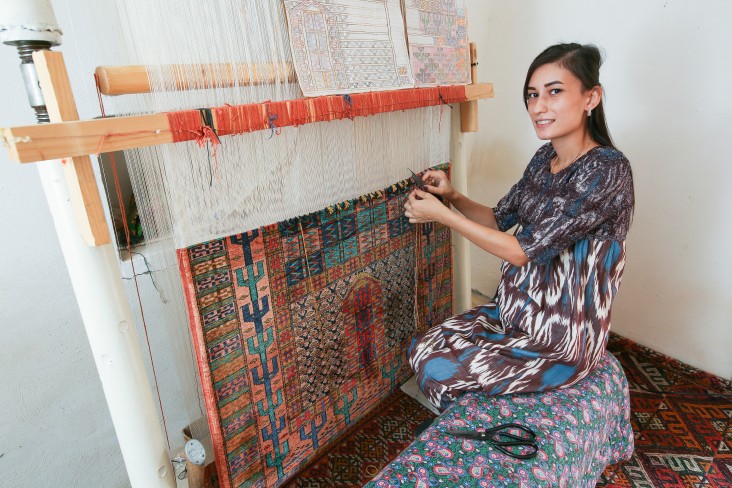Speeches Shim

Revitalizing an Ancient Craft Along the Silk Road
Bakhtiyor Kenjaev, an owner of a small business from Uzbekistan, refurbished a 16th century caravanserai and established the Bukhara Traditional Carpet Weaving Center during the COVID-19 pandemic – making the most of the tourism downturn to be ready when tourists return.
The carpet center is established in a caravanserai – simultaneously revitalizing an ancient trading post as well as an ancient craft of the old Silk Road. Tourists will be able to see the traditional carpet making process and take classes on centuries-old traditional techniques of carpet making and natural dyeing.
Bukhara is an attractive tourist destination famous for its UNESCO World Heritage historic center, mosques, and madrasas. A leading trading center along the Silk Road, the city has long served as a center of trade, scholarship, and culture and is a well-known medieval center of carpet weaving.
Wideoyster’s special Edition on Central Asia, an online travel magazine, supported by USAID, welcomes tourists to discover the five countries that form Central Asia, including Uzbekistan. Bukhara remains a top travel destination for visitors from around the world and is a renowned carpet weaving hub.
The coronavirus pandemic has disrupted travels globally keeping much of the world’s population at home. Before the pandemic, all shops in the city’s old town were open bustling with tourists – the ancient city of Bukhara was alive.
To contribute to more jobs for women across the tourism sector, USAID’s Competitiveness, Trade, and Jobs activity helped to set up the Bukhara Traditional Carpet Weaving Center. Under its Innovation Facility, USAID funded the procurement of silk yarn and IT equipment for the Center that created new jobs for nearly 20 local young women.
Shakhnoza Radjabova, one of the female employees, is a newlywed in her mid-twenties. Stitch by stitch, line by line, using ancient techniques, she makes silk and wool carpets for sale. With silk threads in her hands she weaves colorful poems that come to life.
“The best city in the world,” this is how Shakhnoza describes Bukhara, a city of dreams, thousand and one nights, the fragrance of fresh bread- non and cardamom. The carpets made in Bukhara travel across borders, countries, and continents. Natural dyes, pure silks, and wool have become a brand recognized worldwide.
Bakhtiyor Kenjaev, the owner of the business says, “My dream is to demonstrate to Uzbek and foreign tourists the traditional techniques of carpet weaving. By purchasing our beautiful carpets, people can feel the living heritage of Uzbekistan.”
The Bukhara Traditional Carpet Center looks forward to welcoming its first tourists and ensuring an ancient craft survives for generations to come. USAID has selected 35 innovative ideas across Central Asia from among concepts submitted by 150 companies and contributed one-fourth of the total cost of almost $8 million to turn these ideas into budding businesses.
Winning ideas ranged from the first charter flights between Tashkent and Lake Issyk Kul to boost tourism, to establishing a pilot cooperative of small farmers from Tajikistan to export their watermelons to Lithuania. Inspiro, the charter company will fully fund the flights in 2021 to become a feature during the tourism season going forward, while consumers enjoyed the watermelons so much that the farmers are expanding production from 12 to 50 hectares.
USAID’s Competitiveness, Trade and Jobs activity facilitates trade and employment in horticulture, tourism, transport, and logistics across the five Central Asian economies. By incentivizing firms to become more regionally competitive and by addressing cross-border impediments to trade, USAID helps to develop a more diverse and competitive private sector and generate export-driven growth.

Comment
Make a general inquiry or suggest an improvement.